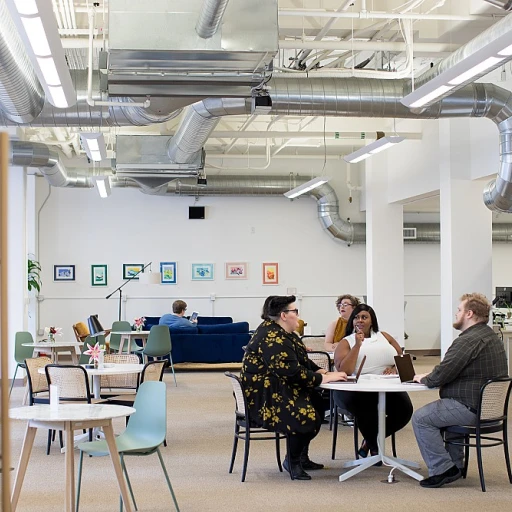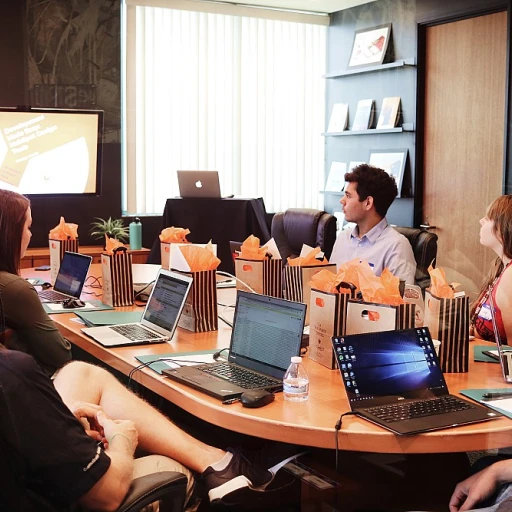
Understanding Shamrock Careers
The Essence of Shamrock Careers
In the evolving landscape of career development, the concept of "shamrock careers" has gained prominence. This paradigm shift is reshaping how individuals perceive and pursue job opportunities, blending traditional employment structures with flexible arrangements. Unlike conventional career paths, shamrock careers embrace diverse work models to meet the dynamic needs of both businesses and employees.
In essence, shamrock careers feature a tri-part arrangement, symbolizing three distinct workforce compositions. These consist of core permanent teams, ongoing part-time or freelance contributors, and flexible temporary hires. This model reflects a changing work philosophy where not every job requires a full-time presence, resulting in a workforce pattern that prioritizes flexibility and adaptability.
This approach is increasingly popular among foods companies and services seeking agility in a competitive market. For instance, in industries such as food and beverage, and financial services, companies employ this model to harness specialized expertise from development managers or sales recruiters. Whether you’re part of a shamrock trading corporation or a dynamic business development firm, this model offers a strategic framework to optimize team strength and foster innovation.
Furthermore, the thriving job market in cities such as Phoenix, Arizona, and Overland Park signals the growing demand for such adaptable roles, enabling businesses to efficiently allocate resources to open positions. As these arrangements continue to gain traction, understanding career opportunities within this framework becomes crucial for both job seekers and recruiters alike, highlighting the pivotal role of flexibility in modern candidate experiences.
The Role of Flexibility in Candidate Experience
Flexibility as a Cornerstone
In the evolving landscape of shamrock careers, flexibility has emerged as a pivotal element in shaping the candidate experience. As businesses like Shamrock Foods and Shamrock Trading Corporation adapt to the changing demands of the workforce, the emphasis on flexible work arrangements becomes increasingly apparent. This shift is not just about accommodating remote work; it’s about creating a dynamic environment where employees can thrive.
For companies operating in diverse sectors such as food and beverage, financial services, and business development, flexibility can mean the difference between attracting top talent and losing them to competitors. In Overland Park, for instance, businesses are recognizing the need to offer flexible schedules to meet the varied needs of their team members. This approach not only enhances job satisfaction but also boosts productivity.
Impact on Recruitment and Retention
Flexibility in the workplace significantly influences recruitment strategies. Companies like RTS International and those in Phoenix, Arizona, are increasingly offering open positions that cater to the diverse needs of candidates. Whether it’s a full-time role in sales or a part-time position in marketing, the ability to tailor work arrangements to individual preferences is a powerful tool for recruitment specialists.
Moreover, flexibility plays a crucial role in retention. Employees who feel valued and supported in their work-life balance are more likely to remain with a company for years. This is particularly true for roles such as account managers and business development managers, where the demands of the job can be intense. By offering flexible options, companies can reduce turnover and build a loyal workforce.
Creating a Culture of Flexibility
Building a supportive work environment requires more than just policy changes; it involves cultivating a culture that embraces flexibility. Companies like Shamrock Foods and others in Fort Lauderdale are leading the way by integrating flexibility into their core values. This cultural shift is essential for fostering a positive candidate experience and ensuring long-term success.
For businesses looking to enhance their candidate experience, exploring career opportunities with Sage Hospitality can provide valuable insights into how flexibility can be effectively implemented. By learning from industry leaders, companies can develop strategies that not only attract top talent but also create a thriving workplace culture.
Adapting Recruitment Strategies
Redefining Hiring Processes
Adapting recruitment strategies is crucial in the dynamic landscape of shamrock careers, where flexibility and adaptability are key. Companies are learning that the traditional models of hiring need to evolve to effectively fill open positions with qualified talent. This is especially true in industries such as food and beverage, where organizations like Shamrock Foods and Shamrock Trading Corporation are notable players. These companies are shifting their focus from just filling roles to creating a more engaging candidate experience. In efforts to streamline the hiring process, businesses are integrating more agile recruiting methods that accommodate the various career paths seen in shamrock models. For instance, incorporating part-time, contract, and full-time roles allows a company to leverage different skill sets and manage workload fluctuations effectively. The flexibility in jobs allows businesses to respond to market demands promptly, such as those observed in fast-paced sectors like sales, business development, and financial services. In Overland Park and Phoenix, Arizona, companies are implementing adaptive strategies to ensure that potential team members are not only competent but also fit well within their organizational culture. The hiring processes are structured to identify candidate strengths and align them with the company's objectives. For example, a sales recruiter might focus on finding professionals with strong business acumen and the ability to develop long-term client relationships—qualities essential for account and development manager full positions. Moreover, technology plays a significant role in reshaping candidate experience. Businesses are utilizing sophisticated software solutions to streamline recruitment and provide greater clarity to candidates about the process. This includes real-time updates and feedback mechanisms, which are essential in maintaining a strong employer brand and ensuring compliance with privacy policy standards. By redefining their recruitment approaches, companies can build resilience and agility, positioning themselves for success in industries that are heavily reliant on people strength and dynamic workflows. To better understand how businesses are adapting their hiring strategies to thrive in this evolving environment, exploring concepts like understanding the concept of a backfill position can be invaluable.Technology's Influence on Shamrock Careers
Embracing Technological Advancements in Shamrock Careers
The evolution of technology has significantly impacted the landscape of shamrock careers, influencing how companies operate and how candidates experience the recruitment process. In the realm of shamrock jobs, technology serves as a pivotal force, reshaping traditional roles and creating new opportunities for flexibility and innovation.
For businesses like Shamrock Foods and Shamrock Trading Corporation, leveraging technology is not just about streamlining operations but also about enhancing the candidate experience. These companies, along with others in diverse sectors such as financial services and food and beverage, are increasingly utilizing advanced tools to manage their recruitment processes more efficiently.
Here are some ways technology is influencing shamrock careers:
- Automation in Recruitment: Automation tools are helping companies manage open positions more effectively. By automating repetitive tasks, recruiters can focus on more strategic activities, such as engaging with potential candidates and building relationships.
- Data-Driven Decision Making: Companies are using data analytics to gain insights into candidate behavior and preferences. This helps in tailoring the recruitment process to meet the specific needs of candidates, thereby improving their overall experience.
- Remote Work Technologies: With the rise of remote work, technologies that facilitate virtual collaboration have become essential. Platforms that support video conferencing and project management are crucial for teams spread across different locations, such as those in Overland Park, Phoenix, Arizona, and Fort Lauderdale.
- Enhanced Candidate Engagement: Technology enables better communication between recruiters and candidates. Tools like chatbots and AI-driven platforms provide real-time responses to candidate inquiries, improving engagement and satisfaction.
As companies continue to adopt these technologies, the role of a development manager or a sales recruiter is also evolving. These professionals are now expected to be tech-savvy, capable of navigating digital platforms to enhance business development and account management processes.
In conclusion, the integration of technology in shamrock careers is not just a trend but a necessity for companies aiming to remain competitive. By embracing these advancements, businesses can create a more dynamic and supportive work environment, ultimately strengthening their teams and improving the candidate experience.
Building a Supportive Work Environment
Creating a Culture of Support
In the evolving landscape of shamrock careers, building a supportive work environment is crucial. As companies like Shamrock Foods and Shamrock Trading Corporation navigate the complexities of modern employment, fostering a culture that prioritizes the well-being and development of team members is essential. This not only enhances the candidate experience but also strengthens the company's reputation as a desirable employer.
Emphasizing Flexibility and Inclusion
Flexibility is a key component in creating a supportive environment. Companies must recognize the diverse needs of their workforce, which often includes full-time, part-time, and freelance roles. By offering flexible work arrangements, businesses can accommodate the varied lifestyles of their employees, whether they are based in Overland Park, Phoenix, Arizona, or Fort Lauderdale. This approach not only attracts a wider pool of talent but also boosts employee satisfaction and retention.
Investing in Professional Development
Professional growth opportunities are another pillar of a supportive work environment. Companies should invest in training and development programs that empower employees to advance in their careers. For instance, a business development manager or sales recruiter can benefit from targeted training that enhances their skills in account management or marketing. By prioritizing development, organizations can cultivate a workforce that is both skilled and motivated.
Encouraging Open Communication
Open communication is vital in maintaining a supportive workplace. Encouraging team members to voice their ideas and concerns fosters a sense of belonging and trust. This is particularly important in industries like food and beverage, where collaboration and innovation are key to success. By creating an environment where employees feel heard, companies can drive engagement and productivity.
Prioritizing Employee Well-being
Finally, prioritizing employee well-being is essential in a supportive work environment. This includes offering comprehensive benefits, promoting work-life balance, and ensuring a safe and inclusive workplace. Companies like RTS International and others in the financial services sector can set an example by implementing policies that support the physical and mental health of their employees.
In conclusion, building a supportive work environment is a multifaceted effort that requires attention to flexibility, development, communication, and well-being. By focusing on these areas, companies can enhance the candidate experience and position themselves as leaders in the dynamic world of shamrock careers.













